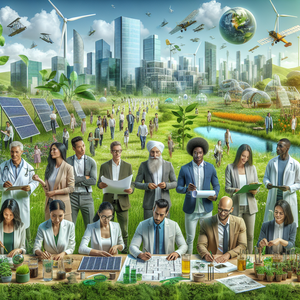
Top Careers in Environmental Engineering: Roles, Skills, and Opportunities to Shape a Sustainable Future
Environmental engineering has emerged as a vital field in the modern world, addressing some of the most critical challenges of our time—climate change, pollution, and the sustainable use of resources. As global industries, governments, and communities strive to mitigate the effects of environmental degradation, the demand for skilled environmental engineers continues to increase. These professionals bridge the gap between engineering, environmental science, and public health, offering innovative solutions that safeguard ecosystems and promote sustainability.
Job Summaries:
Environmental Engineer:
- Environmental engineers focus on designing and implementing solutions to mitigate environmental hazards.
- Their work involves conducting environmental impact assessments, developing waste management systems, and ensuring compliance with government regulations.
- With a bachelor’s degree in environmental engineering or a related discipline, professionals in this role address pressing issues like pollution and resource depletion.
- Responsibilities include creating pollution control systems, conducting research, and collaborating with policymakers.
- Skills needed are analytical thinking, project management, and strong communication skills.
Air Quality Engineer:
- Air quality engineers are dedicated to improving and maintaining the quality of the air we breathe.
- They design air pollution control technologies, ensure compliance with environmental standards, and monitor emissions from industrial and urban sources.
- Responsibilities include designing emission-reduction systems, conducting air quality tests, and developing strategies to meet air quality standards.
- Skills needed are proficiency in air quality modeling software and knowledge of environmental regulations.
Water Resources Engineer:
- Water resources engineers develop and manage sustainable water systems, ensuring clean water access and flood prevention.
- Their role includes designing water treatment plants, analyzing hydrological data, and creating irrigation systems that optimize water use.
- Responsibilities include designing water infrastructure, improving water conservation practices, and addressing water scarcity.
- Skills needed are expertise in hydrology, hydraulics, and environmental engineering principles.
Sustainability Consultant:
- Sustainability consultants help organizations adopt eco-friendly practices that reduce their environmental footprint.
- From conducting sustainability audits to developing green business strategies, they play a crucial role in aligning corporate goals with global environmental priorities.
- Responsibilities include advising on energy efficiency, waste reduction, and sustainable certifications like LEED.
- Skills needed are project management, environmental auditing, and knowledge of sustainability frameworks.
Environmental Compliance Specialist:
- Compliance specialists ensure that organizations adhere to environmental laws and regulations.
- They conduct inspections, prepare reports, and recommend practices to meet legal and ethical standards, minimizing ecological harm.
- Responsibilities include monitoring operations for compliance, preparing legal documentation, and offering solutions for regulatory challenges.
- Skills needed are a strong understanding of environmental policies and legal frameworks.
Waste Management Engineer:
- Waste management engineers focus on designing systems to handle waste sustainably.
- From recycling programs to landfill design, they ensure that waste is disposed of or reused in environmentally responsible ways.
- Responsibilities include analyzing waste patterns, developing recycling initiatives, and creating efficient treatment processes.
- Skills needed are knowledge of waste management regulations, data analysis, and process design.
Renewable Energy Engineer:
- Renewable energy engineers design and implement clean energy solutions, such as solar panels, wind turbines, and geothermal systems.
- They play a pivotal role in reducing reliance on fossil fuels and supporting the global transition to renewable energy.
- Responsibilities include conducting feasibility studies, optimizing energy systems, and ensuring regulatory compliance.
- Skills needed are expertise in renewable energy technologies and energy modeling software.
Environmental Health and Safety (EHS) Manager:
- EHS managers ensure workplace safety while minimizing environmental risks.
- They develop employee training programs, design risk mitigation strategies, and ensure compliance with health and safety standards.
- Responsibilities include overseeing workplace safety audits, managing environmental risks, and ensuring adherence to OSHA or similar standards.
- Skills needed are strong leadership, knowledge of safety regulations, and communication skills.
Climate Change Analyst:
- Climate change analysts study the causes and effects of climate change, working to implement strategies that mitigate its impact.
- They use predictive modeling to inform policies and recommend sustainable practices.
- Responsibilities include researching climate patterns, developing risk assessments, and crafting actionable solutions for mitigation.
- Skills needed are data analysis, climate modeling, and policy development expertise.
Green Building Engineer:
- Green building engineers design sustainable structures that minimize environmental impact.
- They incorporate energy-efficient systems, water-saving technologies, and eco-friendly materials into construction projects.
- Responsibilities include designing eco-friendly buildings, integrating renewable energy solutions, and achieving LEED certifications.
- Skills needed are structural engineering expertise and familiarity with green building practices.
Environmental engineering offers a range of exciting career paths, each with the potential to address critical global challenges. Whether designing systems to combat air pollution, developing policies for climate resilience, or creating renewable energy solutions, these professionals are shaping a healthier, more sustainable future. If you’re passionate about solving complex environmental problems, now is the perfect time to explore this field. Pursue certifications, seek internships, and build expertise to unlock opportunities in this rewarding and impactful industry. Together, we can drive innovation and create lasting change for generations to come.
Explore More Jobs

